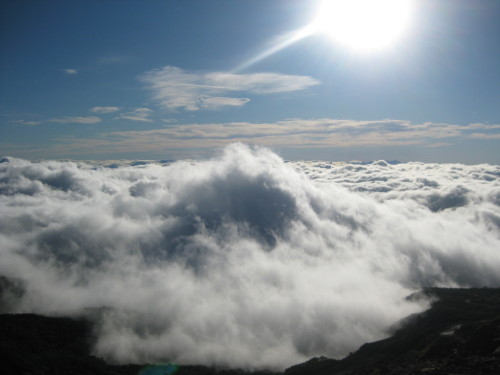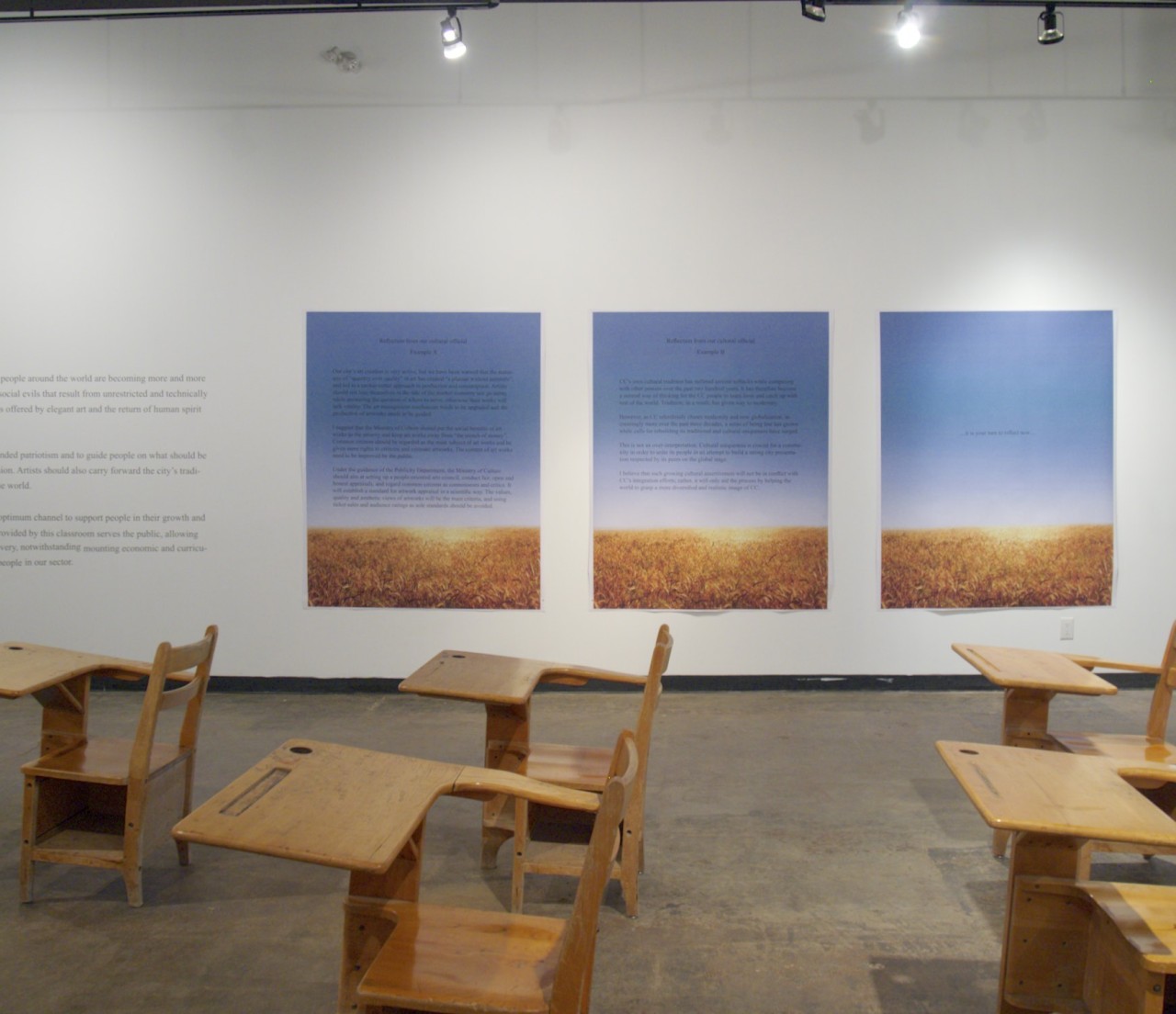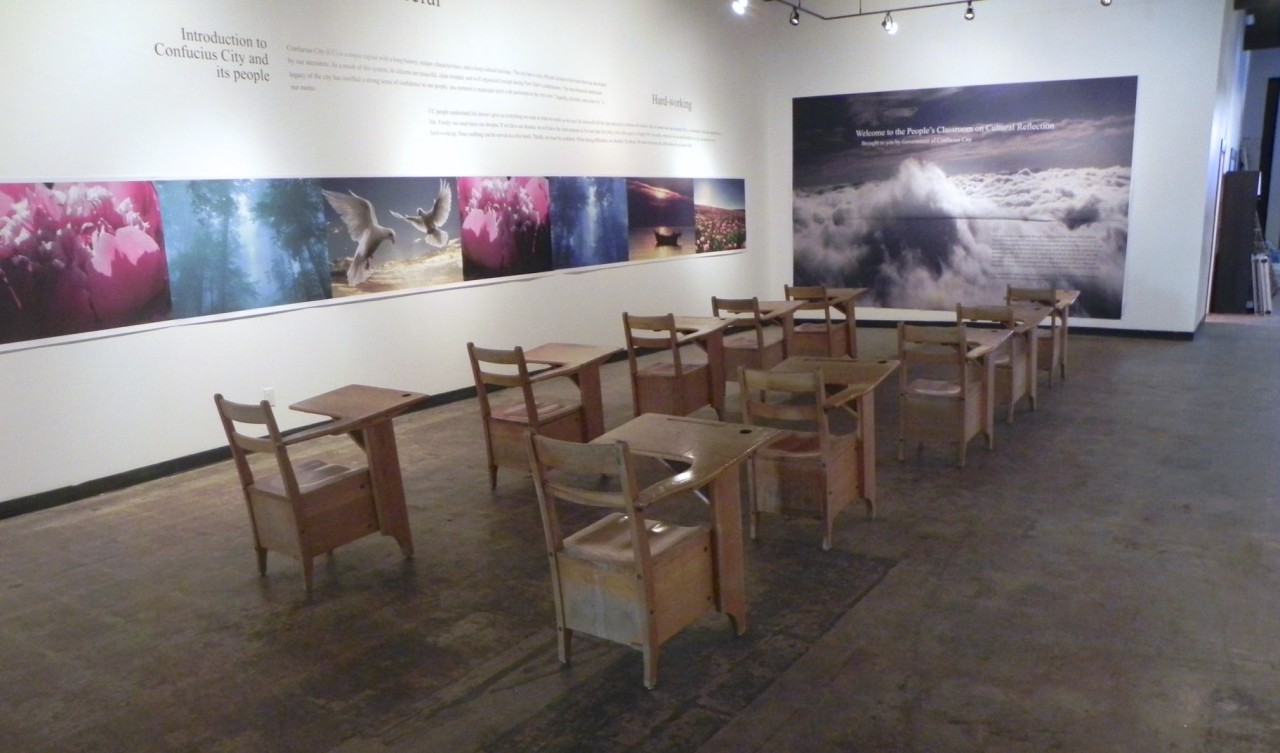Jing Yuan Huang | Classroom on Culture Reflection— Confucius City Edmonton Project
November 21, 2014 – January 17, 2015
Opening reception | Friday, November 21 at 7 pm
The Confucius Institutes are run by the Chinese government and operate within other educational institutions around the world, offering education in Chinese culture from a specific point of view. In the Confucius City Project, Jing Yuan Huang inverts the point of view presented in a fictional classroom, offering a narrative that foregrounds its distortions and emphasizes the discourse that the Chinese State minimizes. Through the installation of text, images, and the classroom itself, the exhibition is at once a familiar cultural and educational space and a strange one.
Essay by Jessie Beier
...and when we finally get to the question “what is education for?” the response is underwhelming.
“Education is for us. It works to produce and reproduce us.”
These words are not always spoken, but they are said. The sentiment that education should work to re-produce the dominant social order—an us as we are currently imagined—resonates between the sparkly jargon spouted by a pre-service teaching population trained in the art of educational rhetoric. Stuck in the hyphenated space between student and teacher, these becoming-pedagogues have learned to deal with the precarity of their situation by reproducing the soft powers necessary to propagate the hopes and dreams of the status quo. The us, as created by this popular imagination, is most often defined by what it is not; this us is neutral; this us is unimplicated; this us is the power of the present projected into the future. Not a future, open to uncertainty, change and thus potential, but rather the future. A future that has already been laid out. (It looks much like today, but with more glass.) It is this future that they imagine when they ask themselves what education should do—what it ought to do—not what it might do.
I tell them that shifting from receiving the world as it is, towards an imagining of what it might be—the world as if—necessitates the invention of a plurality of futures. Such a shift requires fiction-telling, myth-making, and creative expressions in response to life’s tendency to reproduce the world as it is given. Put otherwise, such a shift requires fabulation. Fabulation produces a sort of suspense, an unknown future where there is a breaking-free from the continuity of past reason, of what ought to be. In this way, fabulation is not a mode of escape, but is rather a central aspect of human activity. In fact, there would be no human activity to speak of without the fantastic image of the human we have imagined in the first place! This shining example of the falsity of truth, the dynamic power of the false, the human capacity to fabulate worlds, demonstrates life’s inventive powers. Fabulation offers a style of thought capable of imagining a future that might exist outside the limits of the present, in turn giving us an opportunity to dangle in suspense at the edge of our own thinking.
In Confucius City, Jing Yuan Huang actualizes one such opportunity in the creation of an alternative Confucius Institute classroom. Using a combination of text, image, and found objects, Jing Yuan Huang recreates a typical Chinese grade school classroom, albeit one that offers a contradictory and ironic portrayal of the Confucius Institute and its latent ideologies. In Confucius City, the Confucius Institute is not only represented as a major power in the development of educational policy and practice in China (and beyond), but also a force that works to advance particular political agendas through the guise of knowledge promotion. Jing Yuan Huang’s sardonic commentary highlights the continuing problems inherent in the misappropriation of the Confucius tradition in the service of reproducing a singular national identity, while at the same time fabulating alter-pedagogical singularities that might offer a moment to think education in terms of what itself can not think.
-
Jessie Beier is a teacher, artist, writer, and researcher based in Edmonton, Alberta. Beier holds a diploma in design and illustration, a Bachelor of Education, and has recently completed a Masters Degree in Curriculum Studies. Beier’s interests in both visual and sonic ecologies have led to an arts-based research and writing practice that works to think of art, in its many forms, as a power for overturning cliché and dismantling common sense habits of interpretation. Beier has published work in multiple venues including the Alberta Journal of Educational Research (University of Alberta), Visual Arts Research (University of Illinois Press), and The Journal of Curriculum and Pedagogy (Taylor and Francis) and currently teaches in the Department of Secondary Education at the University of Alberta.
Jing Yuan Huang was born and raised in mainland China and immigrated to Canada in 2002. She received a BFA from Concordia University in 2005 and a MFA from the School of the Art Institute of Chicago in 2008. Her “Transmigrating Inadequacy” series was exhibited in Chicago, Berlin, and in seven provinces across Canada. After a return to China in 2010, her work has focused on the contradictions and disconnections within Chinese society, and between China and the world.




